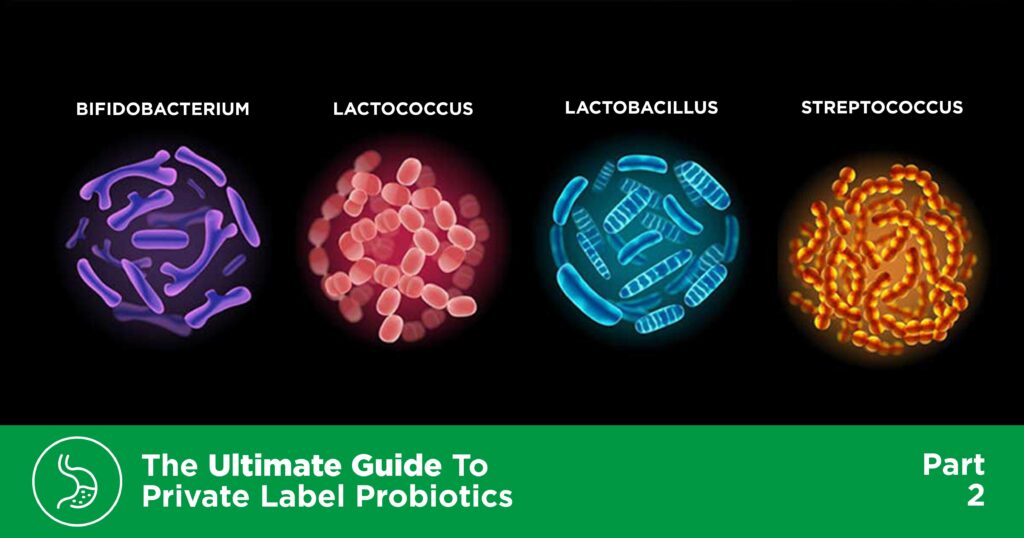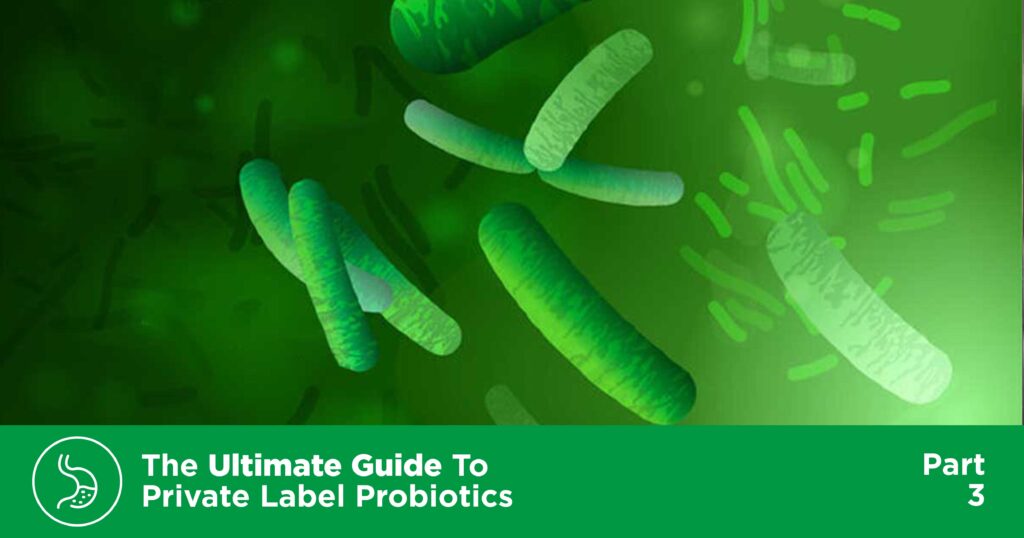The root of the word probiotic comes from the Greek word pro, meaning “promoting” and biotic, meaning “life.”
The global probiotic industry is expected to reach a value of $69.3 billion by 2023. This is largely due to the growing awareness among consumers of the many health benefits they offer. Although probiotics can be found in many foods and beverages, the dietary supplement arena is exploding with offerings of various strains, delivery systems, and potencies, providing the consumer with many options to find a product that will best suit their needs.
Private Label probiotics are one of the fastest growing markets for companies who carry dietary supplements, who must focus on providing scientifically supported, viable, and differentiated products for their customers.
This guide to private label probiotics will provide information about the benefits of probiotic supplementation for consumers, the major types and their specific uses, the process of responsibly manufacturing a probiotic product, and what to look for when choosing a probiotic manufacturer.
Part 1: The Role of Probiotics in Dietary Supplements
Probiotics can be found in a number of foods. Cultured dairy products like yogurt and kefir, and fermented foods such as kimchi, kombucha and pickles all provide a certain amount of probiotic activity. In order for these foods to provide any of the health benefits from those probiotics, however, they must be alive at the time of consumption. Due to the many factors related to food processing and storage that can affect the survival of these organisms, ingesting beneficial amounts of probiotics through foods alone can be a challenge.
Acquiring probiotics through dietary supplements is an easy way to guarantee you are getting enough of these live cultures. Additionally, supplements allow you to choose specific strains, which can be helpful when targeting a particular health condition, and are offered in much higher amounts than can typically be found in a food source.
Probiotics – Tiny Organisms With Huge Benefits

The different bacteria, yeast, and other microorganisms in the gut and throughout the body make up our “microbiome,” and are a unique and integral part of our overall health. Probiotics are specific types of these beneficial microorganisms, and are typically consumed in foods and beverages, or as supplements.
Stress, lack of sleep, surgical procedures, an unbalanced diet, an excess of processed foods, and the consumption of antibiotics can all kill off many of the natural, good bacteria that live within our gut. When the balance of these microorganisms is disrupted, and harmful bacteria outnumber the good bacteria, probiotics can help to replenish the good bacteria and restore health to the gut.
➤ Learn More About the Overall Benefits Private Label Probiotics Offer Consumers.
The Different Types and Health Benefits of Probiotics
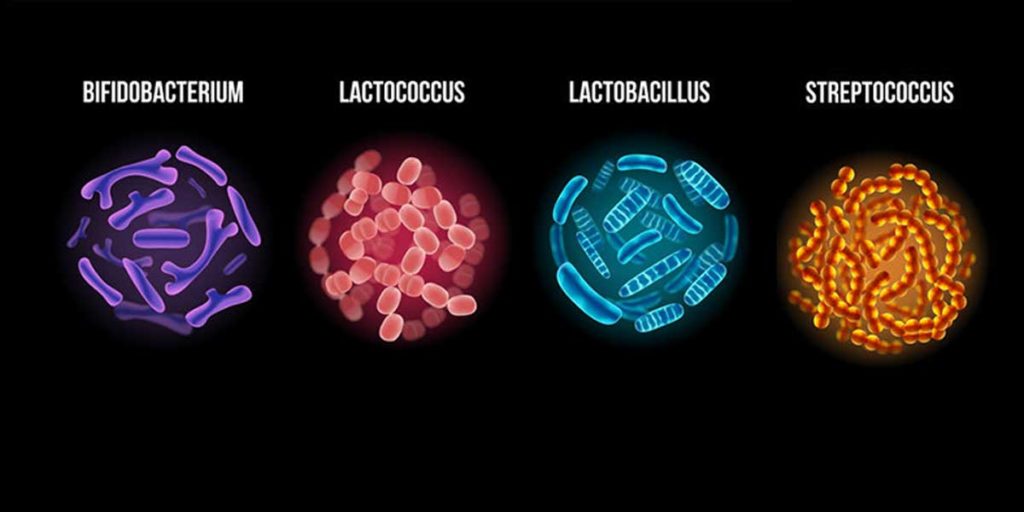
Lactobacillus and Bifidobacterium are the most commonly used and recognized families of probiotics, but each of these large groups contain hundreds of individual species and strains. The number of probiotics in the human body alone are well over 500, many of them offering unique benefits that other strains do not.
The benefits that these diverse microorganisms confer are numerous and have been scientifically shown to assist individuals with depression, anxiety, low energy levels and poor digestion as well as supporting normal, healthy blood pressure, cholesterol and inflammatory indicators.†
Through ongoing studies, we continue to learn even more about how to identify and isolate these different species and strains in order to provide their unique health benefits through their inclusion in dietary supplements.
➤ Learn More About the Different Strains of Probiotics Available for Private Label Supplements.
The Important Role of Prebiotics

Prebiotics are food for probiotics. Fructo-oligosaccharides (FOS) and Galacto-oligosaccharides (GOS) are the two important groups of prebiotics with beneficial effects on human health. Both groups are a food source for lactobacilli, bifidobacterium, and other beneficial probiotics within the intestines. In addition to feeding probiotics, these oligosaccharides can also help the body to absorb magnesium and calcium.
The presence of prebiotics helps to strengthen and increase the number of good bacteria, and also to suppress the growth of bad bacteria, promoting an optimal environment for good digestive health. They should be included as a food source in the formulation of any good quality probiotic supplement.
➤ Learn More About the Importance of Prebiotics in Private Label Probiotic Supplements.
Part 2: Probiotics Through the Manufacturing Process
From strain selection to finished product, manufacturing with probiotics can be challenging. The microorganisms are delicate, and less-than-optimal environments can easily kill them. The manufacturer needs to understand how to include various strains together or with other active ingredients within a formula, the appropriate temperature and handling each strain can tolerate, the various testing protocols required to ensure the product is clean and effective, and which packaging will help protect the organisms in their finished form until its expiration date.
The Advantages of Probiotics in Dietary Supplements
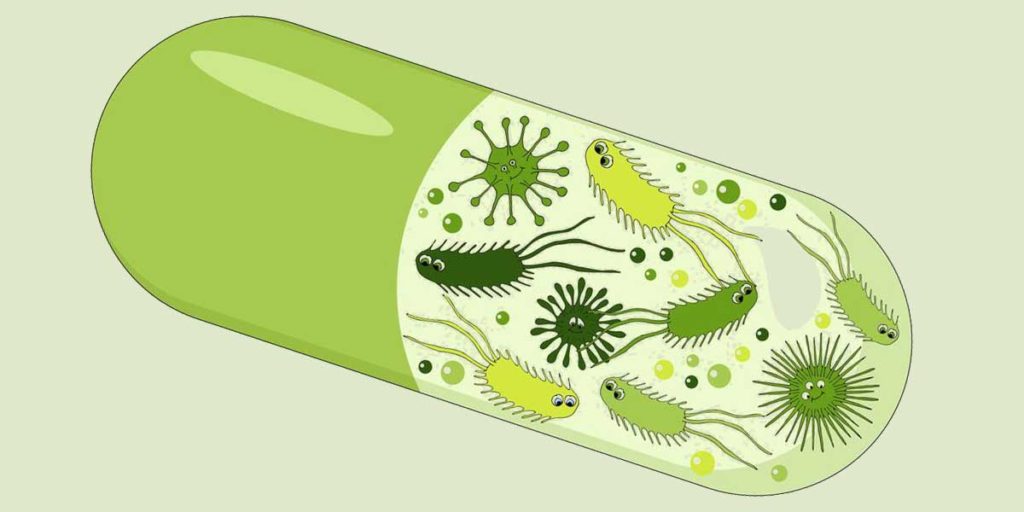
Probiotics in supplement form provide the consumer with an opportunity to ingest more diverse strains and in more potent amounts than can be obtained through foods alone. Additionally, these products offer convenience.
Currently, probiotics can be found in dietary supplements through a number of different delivery systems, or forms. There are probiotic capsules, chewable gummies, protein powders and liquid shots. They are easy to quickly drink, swallow or chew, or to shove in a pocket or bag to be consumed later. These options give consumers control over which probiotics they are consuming, and the freedom to take them when they want to, with or without the presence of food.
➤ Learn More About the Advantages of Probiotics in Dietary Supplements.
Manufacturing Essentials for Private Label Probiotics
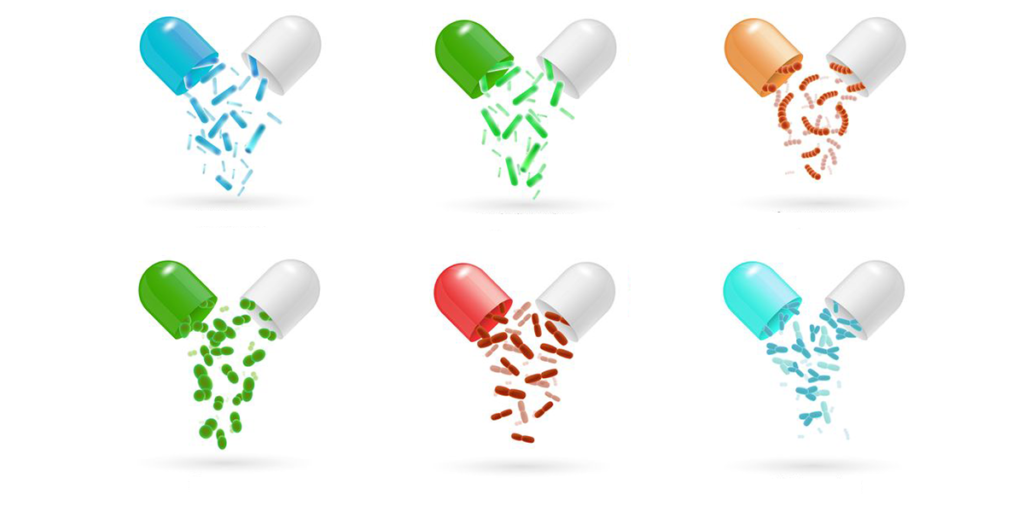
Reliable probiotic supplement manufacturers understand the need to identify which health benefits consumers are looking for, what new trends are on the horizon, and which strains have the scientific research to support them.
Probiotic strains need to be carefully selected. They need to be hardy enough to survive their journey to and through the manufacturing process, and they need to be researched and shown to be effective in offering specific health benefits.
As probiotics are living organisms, their survival can be threatened by prolonged exposure to the wrong environment. Excesses of humidity, moisture, oxidation, cold or heat can harm or kill them. Therefore, it is extremely important that they are both transported and stored in an optimal environment.
As a raw material, prior to manufacturing into a finished product, the live cultures need to be shipped and stored in cool, dehumidified environments. Time spent sitting on a loading dock or warehouse floor in a hot, humid climate might kill them, resulting in the creation of a completely useless product. Once the organisms have been processed and packaged into finished products, they will once again need to be stored in climate and humidity-controlled environments until shipment, and also during transport to their final location.
➤ Learn More About the Essentials of Manufacturing Private Label Probiotics
Quality Control and Testing Throughout the Probiotic Manufacturing Process
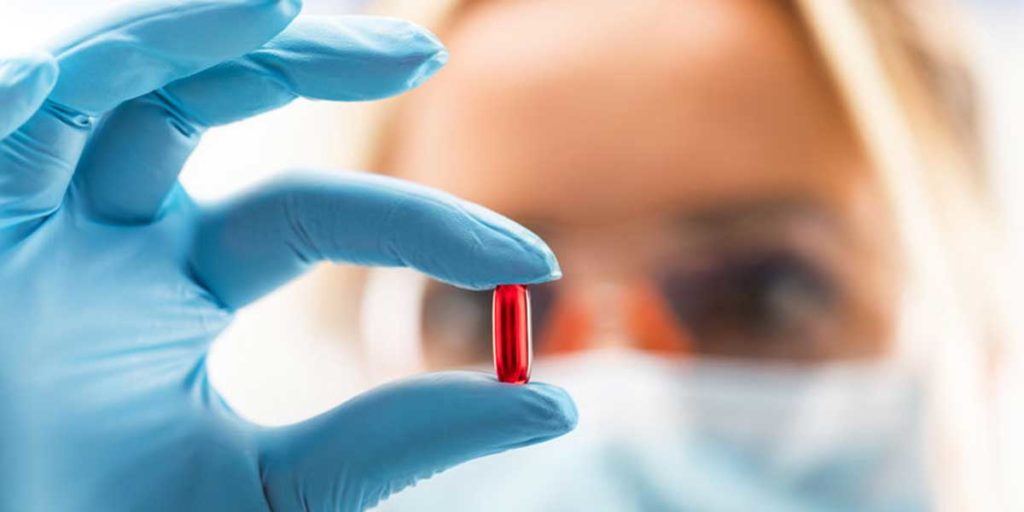
Dietary supplement products should deliver the probiotic count declared on the label throughout the shelf life of the product. This requires a lot of experience and expertise on the part of the manufacturer. In addition to proper strain selection and optimal storage and transport conditions, the formulation and manufacturing of these products is a delicate business.
Just as an inhospitable environment can impair these living organisms, so can certain other active ingredients. If another ingredient is rich in polyphenols, as some ingredients of plant origin are, they may be antimicrobial, and kill off the living probiotics within the formulation. If another active ingredient promotes an increase in moisture, that may also harm or kill the probiotics. Too much compression during tableting, too much heat during part of the intricate production process, or even being packaged in the wrong container can all lead to the creation of a product that no longer offers the number of live, healthy CFUs being listed on the product label.
Probiotic products need to be tested at various but frequent stages throughout their journey to becoming finished products. Once they arrive at the manufacturing facility, there will be many tests and checks done as the probiotic moves from its arrival as a raw material and on through production.
Raw materials will be tested as soon as they enter the building. Finished product testing will happen at time of bottling/packaging, and should also be done at various stages until their time of expiration. In addition to these in-house methods, Third-Party Testing should also be happening. This is done by an independent “third-party” organization to verify the product content and identity, confirm that the product was produced under FDA cGMP (Good Manufacturing Practices) conditions, and to ensure that the product label is accurate and compliant with regulatory standards.
➤ Learn More About Quality Control and Testing for Private Label Probiotic Supplements
How to Select the Right Probiotic Manufacturer

In the world of dietary supplements, it can be very confusing for consumers to identify which products are high-quality, and which are not. This is especially true for probiotic supplements due to the many challenges in manufacturing with these live organisms. Probiotic consumers in the current market are looking for products that will offer them high cell counts, with multiple strains and a long shelf-life, in convenient dosing and delivery systems, without needing to be refrigerated. They also want transparency and traceability, so they can be confident that the product they are choosing will provide the health benefits they are seeking.
Successfully delivering these high-quality products, with consistency and reliability, requires an experienced manufacturer. The right strains need to be selected for formulation, then safely and effectively transported and stored. Multiple Quality Control measures throughout the entire production process need to be met and maintained. The finished product needs to meet it’s label claims through it’s expiration date. An independent, 3rd party validation should support the testing and finished product results the manufacturer is showing. Lastly, documentation at each of these steps should be collected, and made available for review along with the testing results.
➤ Learn More About Selecting the Right Manufacturer for Private Label Probiotic Supplements
Supplemental Information
Common Questions Consumers Have About Probiotics
Learn the answers to the most commonly asked questions about probiotics by consumers who take or are considering taking a probiotic product.

†These statements have not been evaluated by The Food and Drug Administration. This product is not intended to diagnose, treat, cure or prevent any disease.




